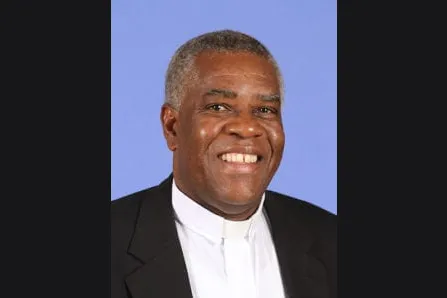.
 Father Jacques Fabre, C.S., who was appointed Bishop of Charleston Feb. 22, 2022. / null
Father Jacques Fabre, C.S., who was appointed Bishop of Charleston Feb. 22, 2022. / null
Charleston, S.C., Feb 22, 2022 / 17:09 pm (CNA).
Bishop-elect Jacques Fabre of Charleston spoke of his desire for unity in a divided time during an introductory press conference on Tuesday.
Fabre’s episcopal appointment was made public Feb. 22. The 66-year-old, who was born in Port-au-Prince, and moved to the United States as a teenager, has administered the San Felipe de Jesús Mission in Georgia for the past 12 years. He previously served as a chaplain to Haitian refugees in Guantanamo, Cuba.
Bishop Emeritus Robert Guglielmone, 76, retired upon reaching the mandatory retirement age of 75.
Speaking at the press conference, Guglielmone said it was a “great day for the diocese” with the appointment of the new bishop, and that it had been “a delight” to have a few conversations with Fabre prior to his arrival in Charleston. Guglielmone referred to his successor as “a great gift to the Diocese of Charleston.”
In his first public statements to the diocese, Fabre explained that even though he is “used to being in front of thousands of people” each week, he was “filled with fear” at his first press conference as bishop-elect.
He joked that the combination of his French accent with his Brooklyn accent meant that the press would have to “bear with me” during his address. Throughout the press conference, Fabre spoke in English, Creole, French, Spanish, and Italian, noting that English was his third language.
Fabre said that when he received the call that he had been appointed a bishop, it was Sunday morning after the six o’clock Mass.
“I was listening to confessions, and I received a call from the nuncio,” he said.
“I said, ‘you must be kidding,’ and he said ‘I don’t – I do good stuff, serious stuff. And I’m serious.’”
“And I said ‘no, you’re joking,’’’ Fabre said with a chuckle. Afterwards, he “just knelt down” and was very afraid about what would happen next.
“Because of that fear, I began to really trust in the Holy Spirit,” said Fabre.
Fabre said that he wondered why a different priest, someone who was possibly more prepared, was not chosen over him for the position. Eventually, he came to realize that it was meant to be.
“I know that if the Mother Church chose me, it’s because of something that they see that I’m not able to see,” he said.
“So together, we want to learn what it is, to search for what it is, so we can, together, give testimony to God’s love.
Fabre, who is not related to Bishop Sheldon Fabre of Houma-Thibodeaux, said that initially, he planned on becoming an engineer. He was turned off from that career path when a professor said that engineers would have to “sell themselves.”
After that, Fabre said he went back to his parish, prayed, and decided to become a priest. He entered the Missionaries of St. Charles, who are also known as the Scalabrinians. The order, which is largely Italian, focuses its work on refugees and migrants.
As the fourth Haitian to join the order, Fabre said that “it wasn’t easy to adapt, to fit in,” at first. He likened his experience as a new priest to moving to Charleston, saying that he was “looking forward to learning” and he would “be building” on the work laid out by Guglielmone.
“The American system of life is always thinking about the future, the next generation,” said Fabre. “While (for) us, I’m from Haiti, we think about today, for me. Whatever I do is for me, and for my family, not for the future.”
“Whatever we’ll be doing together is to make sure that we leave a Church which is stronger, a society which is stronger, and a society that can accept everyone and find their place and exercise the gifts that God has given us, all of us, different gifts,” he said.
People coming together and sharing their gifts “can create miracles,” explained Fabre, saying that he had seen this at his past appointments. He said that even though this is a time of division, he hopes that he will be able to bring people together.
“I feel like I’m like the prophet Amos,” he said. “I’ve been called from a mission Church into a cathedral.” For the entirety of his priesthood, Fabre has been in “rural areas,” and this will be his first time working in a city.
“I received a call, and I said ‘now you need to stop being yourself and let God take you and lead you,’” said Fabre. “And I will do that, with your prayers.”
Fabre will be consecrated and installed as Bishop of Charleston on April 29.